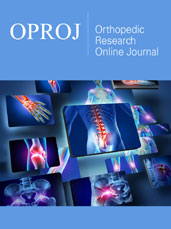- Submissions

Abstract
Orthopedic Research Online Journal
Manual Dexterity Training for Orthopaedic Residents - Non-Patient based Methodologies
-
Open or CloseFerras Albitar, Evan Carey and Srinath Kamineni*
Department of Orthopaedics and Sports Medicine, University of Kentucky, USA
*Corresponding author: Srinath Kamineni, Department of Orthopaedics Surgery, Elbow Shoulder Research Centre, University of Kentucky, USA
Submission: August 03, 2020;Published: September 02, 2020

ISSN : 2576-8875Volume7 Issue3
Abstract
Background: Orthopaedic surgical techniques are complex, rapidly evolving, and require significant training to attain competence. Hindrances to acquiring these complex skills during residency include: work hour restrictions, inconsistent case volumes, and policy changes centered on operating room (OR) efficiency and patient safety. The evolution of orthopaedic training in response to these challenges forced the development of non-patient-based training methods outside of the OR. Understanding how orthopaedic residents develop and retain surgical skills will hopefully provide more efficient training. The different methods, their respective advantages, and evidence of their efficacy is necessary to direct resident training in the future.
Methods: PubMed and Google Scholar were searched for literature related to orthopaedic resident training. The resulting articles were used to find other manuscripts pertinent to the subject. Training methods involving patients were excluded.
Results: Non-patient-based methods for orthopaedic resident surgical training include cognitive training for knowledge acquisition, low fidelity models for basic skills, bench-top models for arthroscopic skill development, cadaveric and animal models, synthetic bone models, and virtual reality simulators. Evidence for the type of training resulting in the most robust skills acquisition and retention, supports targeted, deliberate practice in spaced repetitions using a competency-based curriculum.
Conclusion: A variety of non-patient based methods exist for surgical skill development, aimed at mitigating challenges faced by orthopaedic residents. Despite their abundance, evidence supporting direct transfer of skills learned via these methods to the OR is rare in orthopedics. Barriers to their use and implementation, namely a lack of funding, are prevalent.
Keywords: Orthopaedics; Surgical education; Simulation; Arthroscopy; Clinical competence; Resident training
 a Creative Commons Attribution 4.0 International License. Based on a work at www.crimsonpublishers.com.
Best viewed in
a Creative Commons Attribution 4.0 International License. Based on a work at www.crimsonpublishers.com.
Best viewed in 







.jpg)






























 Editorial Board Registrations
Editorial Board Registrations Submit your Article
Submit your Article Refer a Friend
Refer a Friend Advertise With Us
Advertise With Us
.jpg)






.jpg)














.bmp)
.jpg)
.png)
.jpg)










.jpg)






.png)

.png)



.png)






